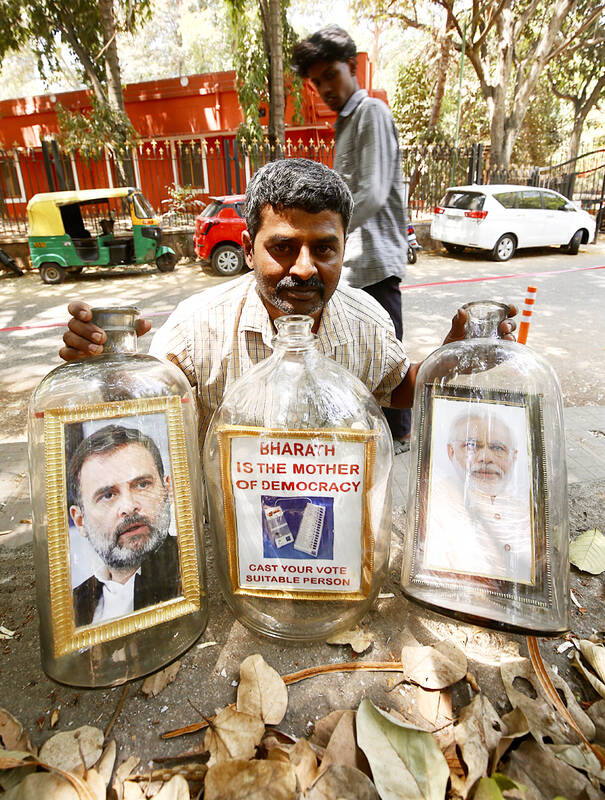Indian Prime Minister Narendra Modi reaffirmed his pledge to replace India’s religion-based marriage and inheritance laws with a uniform civil code if he returns to office for a third term, a move that some minority groups have opposed.
In an interview with the Times of India listing his agenda, Modi said his government would push for making the code a reality.
“It is clear that separate laws for communities are detrimental to the health of society,” he said in the interview published yesterday. “We cannot be a nation where one community is progressing with the support of the Constitution while the other community is stuck in a time warp due to appeasement.”

Photo: EPA-EFE
Previous governments have stayed away from amending the religious and customary laws that govern India largely for fear of angering voters — the majority Hindu, as well as minority Christian and Muslim groups — as it could potentially clash with their right to practice their faith.
Modi’s government has not released any proposals on how it plans to change the current laws, but some minority groups have raised concerns that it might target Muslims.
Creating a new civil code has featured prominently in Modi’s Bharatiya Janata Party (BJP) election manifestos in the past two national elections and remains a key, but unfulfilled part of its Hindu nationalist agenda.
Modi is seeking to extend his decade in power by another five years in elections that began on April 19 and are to run until June 1. Results are expected on June 4.
The prime minister also reiterated a pledge to have simultaneous local and national polls, under the slogan “one nation-one election.”
The BJP has long pushed to have concurrent elections as a way to cut down costs, although opposition groups have said it goes against India’s federal system.
Modi also responded to allegations from the opposition that recent comments he made on the campaign trail were religiously divisive. He said he was calling out the policies of the Indian National Congress, the main opposition, which favor affirmative action for some groups.
“To show that Congress violated the constitution by enacting laws to provide reservations on the basis of religion is not polarization,” Modi said.
The prime minister also responded to a debate last week sparked by a Congress official’s comments about using an inheritance tax to redistribute wealth.
“I do not think they are solutions by any stretch of imagination. These are actually dangerous problems disguised as solutions,” Modi said. “Would you work day and night if the government would take away your money at the end in the name of redistribution?”
To boost growth, the government needs to remove barriers and empower people, he said.
“This unleashes their entrepreneurial potential as we have seen in our country,” he said.

Kehinde Sanni spends his days smoothing out dents and repainting scratched bumpers in a modest autobody shop in Lagos. He has never left Nigeria, yet he speaks glowingly of Burkina Faso military leader Ibrahim Traore. “Nigeria needs someone like Ibrahim Traore of Burkina Faso. He is doing well for his country,” Sanni said. His admiration is shaped by a steady stream of viral videos, memes and social media posts — many misleading or outright false — portraying Traore as a fearless reformer who defied Western powers and reclaimed his country’s dignity. The Burkinabe strongman swept into power following a coup in September 2022

‘FRAGMENTING’: British politics have for a long time been dominated by the Labor Party and the Tories, but polls suggest that Reform now poses a significant challenge Hard-right upstarts Reform UK snatched a parliamentary seat from British Prime Minister Keir Starmer’s Labor Party yesterday in local elections that dealt a blow to the UK’s two establishment parties. Reform, led by anti-immigrant firebrand Nigel Farage, won the by-election in Runcorn and Helsby in northwest England by just six votes, as it picked up gains in other localities, including one mayoralty. The group’s strong showing continues momentum it built up at last year’s general election and appears to confirm a trend that the UK is entering an era of multi-party politics. “For the movement, for the party it’s a very, very big

ENTERTAINMENT: Rio officials have a history of organizing massive concerts on Copacabana Beach, with Madonna’s show drawing about 1.6 million fans last year Lady Gaga on Saturday night gave a free concert in front of 2 million fans who poured onto Copacabana Beach in Rio de Janeiro for the biggest show of her career. “Tonight, we’re making history... Thank you for making history with me,” Lady Gaga told a screaming crowd. The Mother Monster, as she is known, started the show at about 10:10pm local time with her 2011 song Bloody Mary. Cries of joy rose from the tightly packed fans who sang and danced shoulder-to-shoulder on the vast stretch of sand. Concert organizers said 2.1 million people attended the show. Lady Gaga

SUPPORT: The Australian prime minister promised to back Kyiv against Russia’s invasion, saying: ‘That’s my government’s position. It was yesterday. It still is’ Left-leaning Australian Prime Minister Anthony Albanese yesterday basked in his landslide election win, promising a “disciplined, orderly” government to confront cost-of-living pain and tariff turmoil. People clapped as the 62-year-old and his fiancee, Jodie Haydon, who visited his old inner Sydney haunt, Cafe Italia, surrounded by a crowd of jostling photographers and journalists. Albanese’s Labor Party is on course to win at least 83 seats in the 150-member parliament, partial results showed. Opposition leader Peter Dutton’s conservative Liberal-National coalition had just 38 seats, and other parties 12. Another 17 seats were still in doubt. “We will be a disciplined, orderly